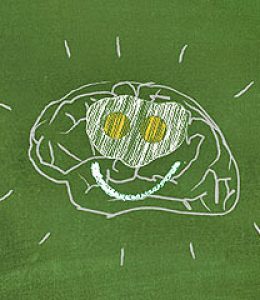Brain Health
Maintaining a brain-healthy lifestyle that includes regular physical exercise, a balanced diet rich in fruits and vegetables, mental stimulation, stress management, and adequate sleep is fundamental.
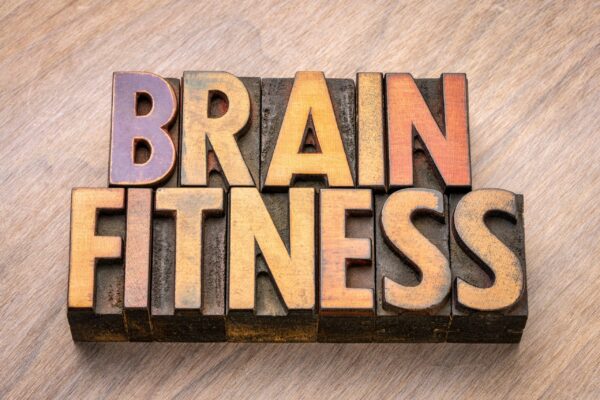
Recommended Supplements
Browse our most popular supplements related to brain health.
-
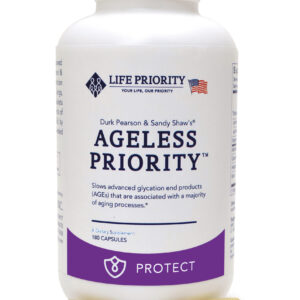
AGELESS PRIORITY™
Rated 5.00 out of 5$84.95 — or subscribe and save 15% Add to cart -

MIND™
Rated 5.00 out of 5$30.95 — or subscribe and save 15% Add to cart -
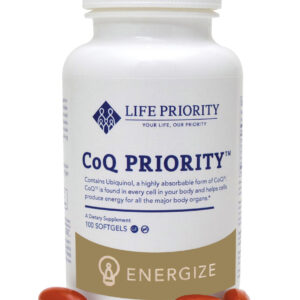
CoQ PRIORITY™
$49.95 — or subscribe and save 15% Add to cart -
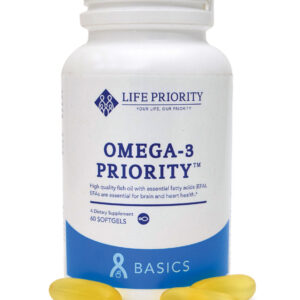
OMEGA-3 PRIORITY™
Rated 5.00 out of 5$29.95 — or subscribe and save 15% Add to cart
Clarity & Energy
-

PS PRIORITY™
Rated 5.00 out of 5$42.95 — or subscribe and save 15% Add to cart -

PRODUCTIVE SLEEP™
Rated 5.00 out of 5$44.95 — or subscribe and save 15% Add to cart -
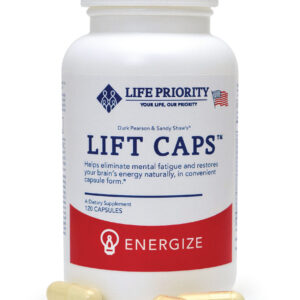
LIFT CAPS™
Rated 5.00 out of 5$34.95 — or subscribe and save 15% Add to cart -

LIFT™ Powder
Rated 5.00 out of 5$29.95 — or subscribe and save 15% Add to cart
Brain health resources and other health related topics.
How Can Life Priority Supplements Help With Brain Health?
Maintaining a brain-healthy lifestyle that includes regular physical exercise, a balanced diet rich in fruits and vegetables, mental stimulation, stress management, and adequate sleep is fundamental.
Supplements can play a role in supporting brain health, but it’s essential to emphasize that they should not replace a balanced diet, good sleep, physical activity, and other aspects of a healthy lifestyle. A well-rounded approach to brain health includes various factors beyond supplementation. However, some supplements have been studied for their potential benefits in supporting cognitive function and overall brain health.
Which Supplements are Best for Brain Health?
Some supplements have been studied for their potential benefits in supporting cognitive function and overall brain health. Here are a few examples:
Omega-3 Fatty Acids: Omega-3 fatty acids, particularly eicosapentaenoic acid (EPA) and docosahexaenoic acid (DHA) found in fish oil, have been associated with cognitive benefits. They may support brain function and reduce the risk of age-related cognitive decline.
Vitamins and Minerals: Certain vitamins and minerals, such as B vitamins (B6, B9, B12), vitamin D, and magnesium, are important for brain function. Deficiencies in these nutrients can affect cognitive performance, so supplementation may be beneficial if there’s a deficiency.
Phosphatidylserine: This phospholipid is naturally present in the brain and is available as a dietary supplement. Some research suggests that phosphatidylserine may help with age-related cognitive decline.
Ginkgo Biloba: Ginkgo biloba extract is believed to improve blood flow to the brain, potentially supporting cognitive function. It’s commonly used to help with memory and thinking problems associated with aging.
Curcumin (Turmeric): Curcumin, an active compound in turmeric, has anti-inflammatory and antioxidant properties that may support brain health. Some studies suggest it could be beneficial for conditions like Alzheimer‘s disease.
Acetyl-L-Carnitine: This amino acid may have a role in reducing cognitive decline and supporting brain function, especially in older adults.
L-Theanine: L-Theanine, is an amino acid that is found in oolong tea and other types of tea. It is believed to have a number of potential health benefits, including improving mental alertness and reducing stress.
Brain Health Supplements
Supplements can play a role in supporting brain health, but it’s essential to emphasize that they should not replace a balanced diet, good sleep, physical activity, and other aspects of a healthy lifestyle. A well-rounded approach to brain health includes various factors beyond supplementation. However, some supplements have been studied for their potential benefits in supporting cognitive function and overall brain health.
Need help figuring out where to start? Contact Us!
Health Coaches - Free Consultation!
8 am – 5 pm Central, Mon – Fri
Schedule Free Consultation
Dr. Larry Houston
What vitamins are good for brain fog and memory?
Brain fog is a term used to describe a subjective feeling of mental haziness or confusion, often accompanied by a sense of reduced mental clarity and difficulty concentrating or thinking clearly. It can manifest as forgetfulness, difficulty processing information, and a general sense of mental fatigue. While brain fog is not a medical diagnosis itself, it can be a symptom of various underlying causes, including stress, sleep deprivation, certain medical conditions, nutritional deficiencies, and medication side effects. Brain fog can significantly impact daily functioning, making tasks that typically require mental focus and attention more challenging. It’s important to address the root causes of brain fog to alleviate the symptoms and regain cognitive clarity.
Which supplements can help with memory and forgetfulness?
When Vitamin B12 and folate supplements are used together, they work in synergy to boost the synthesis of serotonin and dopamine. Both of these vitamins have significant roles in the regulation and preservation of a healthy mental state. It’s worth noting that the elderly population is more prone to vitamin B12 deficiency.
What are brain health supplements and what do they contain?
Brain health supplements are dietary supplements that are marketed as products intended to support and enhance cognitive function, memory, mental clarity, and overall brain health. These supplements often contain various vitamins, minerals, herbs, and other compounds that are believed to have potential cognitive-enhancing properties.
What are the benefits of taking supplements for brain health?
Supplements for brain health can offer several potential benefits when used appropriately and in consultation with a healthcare provider. These benefits may include:
Cognitive Support: Certain supplements, like omega-3 fatty acids, B vitamins, and antioxidants, can support cognitive function, memory, and mental clarity. They provide the essential nutrients required for optimal brain health.
Mood Regulation: Some supplements, such as omega-3 fatty acids and vitamin D, have been linked to mood regulation and may help manage symptoms of depression, anxiety, and stress.
Neuroprotection: Antioxidant supplements, like vitamin C and vitamin E, as well as anti-inflammatory compounds such as curcumin, may help protect brain cells from oxidative stress and inflammation, potentially reducing the risk of neurodegenerative diseases.
Improved Concentration and Focus: Certain nootropics, caffeine, and L-Theanine can enhance alertness, focus, and attention, which can be especially beneficial for tasks that require mental clarity.
Prevention of Cognitive Decline: While more research is needed, some supplements may play a role in reducing the risk of age-related cognitive decline and neurodegenerative diseases when used as part of a comprehensive brain-healthy lifestyle.
Enhanced Mental Energy: Supplements like acetyl-L-carnitine can help improve mental energy and reduce mental fatigue.
Management of Brain Fog: For individuals with nutrient deficiencies contributing to brain fog, supplements can help alleviate cognitive symptoms and improve overall mental clarity.
Optimal Brain Development: Certain supplements, like folate, are important during pregnancy and early childhood for proper brain development.
It’s important to emphasize that the effectiveness of these supplements can vary from person to person, and not all supplements are supported by robust scientific evidence. Additionally, supplements should be used with caution and under the guidance of a healthcare provider, as inappropriate or excessive use can be harmful.
A comprehensive approach to brain health should include a healthy diet, regular physical activity, mental stimulation, stress management, and adequate sleep. Supplements should complement these healthy lifestyle practices, not replace them. Before starting any supplement regimen for brain health, consult with a healthcare provider to assess your specific needs and ensure the supplements you are considering are safe and appropriate for you.
Who should take supplements for brain health?
The decision to take supplements for brain health should be made on an individual basis and in consultation with a healthcare provider. Not everyone needs or will benefit from brain health supplements, and their use depends on various factors, including one’s overall health, dietary habits, and specific cognitive concerns. Here are some considerations for individuals who might benefit from brain health supplements:
Cognitive Concerns: If you are experiencing cognitive symptoms such as memory problems, brain fog, difficulty concentrating, or mood issues, you may consider supplements after consulting with a healthcare provider. These symptoms can sometimes be linked to nutrient deficiencies or other underlying health issues.
Dietary Restrictions: Individuals with dietary restrictions, such as vegetarians or vegans, may benefit from supplements to ensure they receive essential nutrients like vitamin B12 and omega-3 fatty acids that are typically found in animal products.
Specific Health Conditions: Certain medical conditions, like Alzheimer’s disease, Parkinson’s disease, or multiple sclerosis, may warrant supplements as part of a broader treatment plan. In these cases, healthcare providers may recommend specific supplements to address cognitive symptoms.
Nutrient Deficiencies: Individuals with known nutrient deficiencies, such as low vitamin D levels or anemia (iron deficiency), may require supplementation to address these deficiencies, which can impact cognitive health.
Pregnant and Nursing Women: Pregnant and nursing women may need supplements, such as folic acid and prenatal vitamins, to support the developing brain of the fetus and the cognitive health of the mother.
Elderly Individuals: Older adults may benefit from supplements that support cognitive function, as age-related changes can impact brain health. This includes nutrients like B vitamins, vitamin D, and omega-3 fatty acids.
Individuals with Specific Medications: Some medications can deplete certain nutrients or interact with them, necessitating supplementation. For example, certain medications can affect the absorption of vitamin B12 or folate.
Genetic Factors: Some individuals may have genetic variations that affect their ability to metabolize certain nutrients, such as folate. In such cases, healthcare providers may recommend specific forms of nutrients, like L-methylfolate.
It’s important to consult with a healthcare provider before starting any supplement regimen for brain health. They can assess your specific health needs, monitor your progress, and ensure that the supplements you are considering are safe and appropriate for you. Additionally, the use of supplements should be guided by a healthcare provider to avoid potential interactions with medications and ensure that they do not exceed recommended dosages. A balanced diet, regular physical activity, mental stimulation, stress management, and adequate sleep are fundamental aspects of brain health and should not be overlooked. Supplements should complement these healthy lifestyle practices, not replace them.
When should you take supplements for brain health?
The timing for taking supplements for brain health can vary depending on the specific supplement, your individual health needs, and your healthcare provider’s recommendations. Here are some general guidelines for when and how to take supplements for brain health:
Follow Healthcare Provider’s Advice: The most crucial step is to consult with a healthcare provider. They can assess your individual health status, recommend specific supplements if necessary, and provide guidance on the timing, dosage, and duration of supplementation.
Timing with Meals: Many supplements are better absorbed when taken with meals. Taking supplements with food can also help reduce the likelihood of stomach upset or digestive issues. For example, fat-soluble vitamins like vitamin D and some minerals are often better absorbed when consumed with a meal that contains some fat.
Consistency: Take your supplements consistently as recommended. Consistency is key to achieving the potential benefits of supplementation.
Split Doses: In some cases, it may be more effective to split the dose of a supplement throughout the day. For example, water-soluble vitamins like vitamin C are often taken in divided doses to maintain stable blood levels.
Avoid Interactions: Be aware of potential interactions between supplements and medications. Some supplements may interfere with the absorption or effectiveness of certain medications. Discuss potential interactions with your healthcare provider to ensure they are taken at different times if needed.
Time of Day: Some people may prefer to take supplements at a specific time of day that works best for their routine. As long as you follow the healthcare provider’s recommendations and any specific instructions on the supplement label, the exact time of day can be flexible.
Regular Monitoring: If you are taking supplements for a specific brain condition or cognitive concern, your healthcare provider may recommend periodic monitoring of your health status, including blood tests to assess nutrient levels or the impact of the supplements.
Do Not Exceed Recommended Dosages: Avoid taking more than the recommended dosages of supplements. Excessive intake of certain vitamins and minerals can be harmful and may have adverse effects on brain health.
Adjust for Special Circumstances: If you have special circumstances, such as pregnancy, a medical condition, or specific dietary restrictions, your supplement needs may change. Discuss any changes in your health status with your healthcare provider to ensure your supplementation remains appropriate.
What is pregnenolone and is it good for brain health?
Pregnenolone is a hormone and a precursor to other hormones in the body, including progesterone, DHEA, and various steroids. It is produced in the adrenal glands and the brain and plays a role in several physiological processes.
Mood Enhancement: Pregnenolone may have mood-regulating properties and could potentially help with mood disorders like depression or anxiety.
Cognition and Memory: Some research has suggested that pregnenolone may play a role in cognitive function and memory. It may enhance memory and cognitive performance.
Stress Reduction: Pregnenolone may have a role in the body’s stress response, potentially helping to manage stress and its effects on cognitive function.
Focus, Concentration & Clarity
Mind was created by Durk Pearson and Sandy Shaw. This designer food promotes focus, concentration and clarity because of its main ingredient, choline. This nutrient is required to make acetylcholine, an important neurotransmitter that assists in memory and muscle movement.
Helps Boost Mental Clarity
Lift™ is another designer food formula by Durk Pearson and Sandy Shaw. It’s an energy-boosting nutritional supplement to fire up your brain. It alleviates mental fatigue giving you the brain supplements to achieve energy and mental clarity.
Youthful Energy & Removes Brain Fog
LIFT and MIND together will help you achieve not only youthful energy, but removes brain fog, improving your memory These two drinks only work if you work them. Twice a day. Drink it first thing in the morning on an empty stomach. Then in the afternoon for any brain fog that may have moved in because of stress. Any decline in cognitive abilities can happen for many reasons. But LIFT and MIND are the reasons you need to achieve that youthful energy and mental clarity you deserve.
Improve Your Brain Function and Sleep Quality
We want to show you that good sleep doesn’t have to be just a dream. Get more power from your nap! Get more out of the sleep you get.
5 Tips for Improving Your Sleep Quantity & Quality
Few things in life are as universal and as neglected as sleep. While our society does not necessarily promote healthy lifestyles or sleep patterns, you can take your health into your own hands by implementing these tips for better and more restorative sleep.
Choline in Brain Function and Sleep
Sleep is crucial for our health including our physical, mental and emotional well-being. Choline in Brain Function and Sleep Acetylcholine (made from choline) is an important part of regulatory pathways in sleep and many cognitive functions.
Why Life Priority Supplements?
The scientists behind Life Priority, Durk Pearson & Sandy Shaw – Life Extension Scientists & Designer Food™ Formulators are independent experts in anti-aging research and brain biochemistry and have many awards including the Award for Excellence in Health & Education from the Association for Holistic Health, for individuals who have made special contributions to biomedical aging research.



